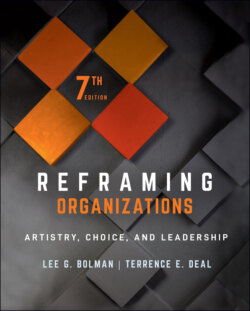Читать книгу Reframing Organizations - Lee G. Bolman - Страница 14
VIRTUES AND DRAWBACKS OF ORGANIZED ACTIVITY
ОглавлениеThere was little need for professional managers when individuals mostly managed their own affairs, drawing goods and services from family farms and small local businesses. Since the dawn of the industrial revolution some 200 years ago, explosive technological and social changes have produced a world that is far more interconnected, frantic, and complicated. Humans struggle to avoid drowning in complexity that continually threatens to pull them in over their heads (Kegan, 1998). Forms of management and organization effective a few years ago are now obsolete. Sérieyx (1993) calls it the organizational big bang:
The information revolution, the globalization of economies, the proliferation of events that undermine all our certainties, the collapse of the grand ideologies, the arrival of the CNN society which transforms us into an immense, planetary village—all these shocks have overturned the rudimentary rules of the game and suddenly turned yesterday's organizations into antiques. (pp. 14–15)
The demands on managers' wisdom, imagination, and agility have never been greater, and the impact of organizations on people's well‐being and happiness has never been more consequential. The proliferation of complex organizations has made most human activities more formalized than they once were. We grow up in families and then start our own. We work for business, government, or nonprofits. We learn in schools and universities. We worship in churches, mosques, and synagogues. We play sports in teams, franchises, and leagues. We join clubs and associations. Many of us will grow old and die in hospitals or nursing homes. We build these enterprises because of what they can do for us. They offer goods, entertainment, social services, health care, and almost everything else that we use or consume.
All too often, however, we experience a darker side of these enterprises. Organizations frustrate and exploit people. Too many people find that work has so little meaning that jobs offer nothing beyond a paycheck. Too often, products are flawed, families are dysfunctional, students fail to learn, patients get worse, and policies backfire. A cruel irony of the Covid‐19 panic was that nursing homes meant to protect and prolong life often became death traps for their residents. If we believe mission statements and public pronouncements, almost every organization these days aims to nurture its employees and delight its customers. But many miss the mark. Schools are blamed for “mis‐educating,” universities are said to close more minds than they open, and government is criticized for corruption, red tape, and rigidity.
The private sector has its own problems. Manufacturers recall faulty cars, defective airplanes, or inflammable cell phones. Producers of food and pharmaceuticals make people sick with tainted products. Software companies deliver bugs and “vaporware.” Industrial accidents pump chemicals, oil, toxic gas, and radioactive materials into the air and water. Corporate greed, incompetence, and insensitivity wreak havoc on communities and individuals. The ill‐fated bottom line: we seem hard‐pressed to manage organizations so that their virtues exceed their vices. The big question: Why?
